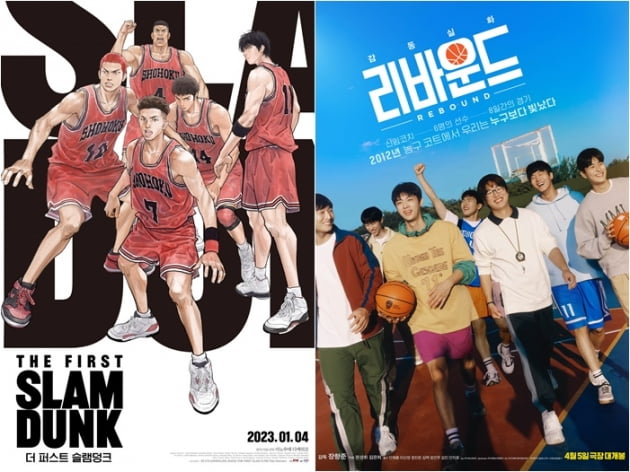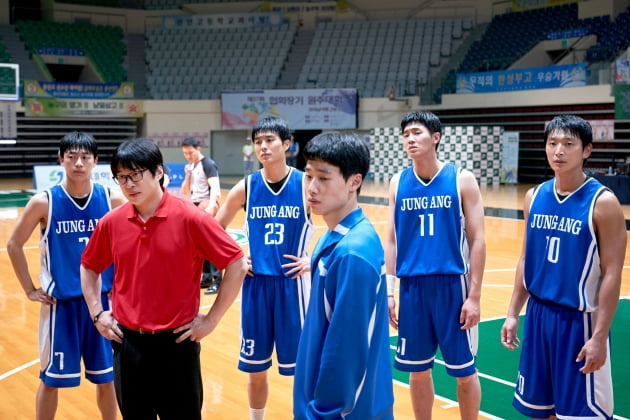MOVIE
Why didn’t ‘Rebound’ become a ‘Slam Dunk’?

TenAsia reporter Choi Ji-ye tells the story of the movie. We analyze every aspect of movies through live on-site reporting and write fun articles with sharp perspectives.
While the Japanese basketball animation 'The First Slam Dunk' recorded surprising results and became a box office hit, the Korean basketball movie 'Rebound' was on the verge of exiting the screen due to its disappointing performance.
'Rebound' (directed by Jang Hang-jun), which was released on the 5th, recorded a cumulative audience of about 620,000 as of the 25th. 'Rebound', in its 4th week of release, is attracting an average of 10,000 viewers per day on weekdays and 30,000 viewers per day on weekends.
Considering the break-even point of 1.6 million people, the film industry's view is that 'Rebound' was actually a box office failure. As we enter the 4th week, there is no clear breakthrough in the recovery. Looking at the reservation rate on the afternoon of the 26th, 'Rebound' is recording 1.2%. 'Super Mario Bros.', an American animation featuring Nintendo's game character Super Mario as the main character (directed by Aaron Horvath and Michael Zerenick)
) is running at 39.2%, and 'Dream' (directed by Lee Byung-hun), which opens on the same day, is running at 21.7%. With the emergence of major new works, the presence of ‘rebound’ is minimal. At this rate, it is predicted that only about 50% of the break-even point will be achieved.
Director Jang Hang-jun's wish to continue the craze of 'The First Slam Dunk' (directed by Takehiko Inoue, hereinafter referred to as 'Slam Dunk') with the live-action film 'Rebound' has come to naught. Prior to the release of 'Rebound', Director Jang joked about the basketball boom caused by 'The First Slam Dunk', calling it a 'blessing from God', but the 'Slam Dunk' craze did not lead to 'Rebound'.
'Slam Dunk' achieved an exceptional box office success, but why did 'Rebound' perform less well than expected?
There may be many reasons, but differences between the two works can be found in the story structure. 'Slam Dunk' has a dense and rich narrative, making it suitable for both enthusiasts and new audiences, but 'Rebound' failed to capture the hearts of audiences due to the predictable progression of the narrative and somewhat old-fashioned directing.

Although some fans of the original work expressed regret over this, it is analyzed that the story structure that twisted the main character attracted not only existing fans but also new audiences, resulting in a further expansion of the 'Slam Dunk' fan base.
Many say that 'Rebound', which is based on the true story of Busan Jungang High School, leaves something to be desired. Because it was based on a true story, the selection and focus of the narrative and the way the story was told were important, but it was evaluated that immersion was reduced due to the fragmentary narrative that did not persuade the audience.
Unlike 'Slam Dunk', which focused on one game between Buksan High School and Sanwang Technical High School and led the story through the insertion of appropriate flashbacks, 'Rebound', which showed several games, did not provide sports catharsis and showed the players' process. It is pointed out that the narrative of how harmony and growth were achieved through this is also missing.

Coach Jang Hang-jun expected to take advantage of the basketball boom caused by 'Slam Dunk', but 'Rebound', which received the baton from 'Slam Dunk', was rather compared and lost its competitiveness. It is time to remind ourselves once again that it is more important to solidify the substance of a movie as a work of art rather than expecting a box office hit thanks to external factors.
Choi Ji-ye, Ten Asia Reporter wisdomart@tenasia.co.kr
